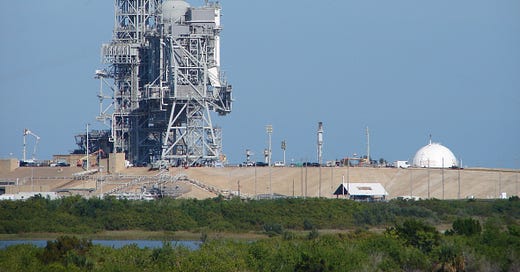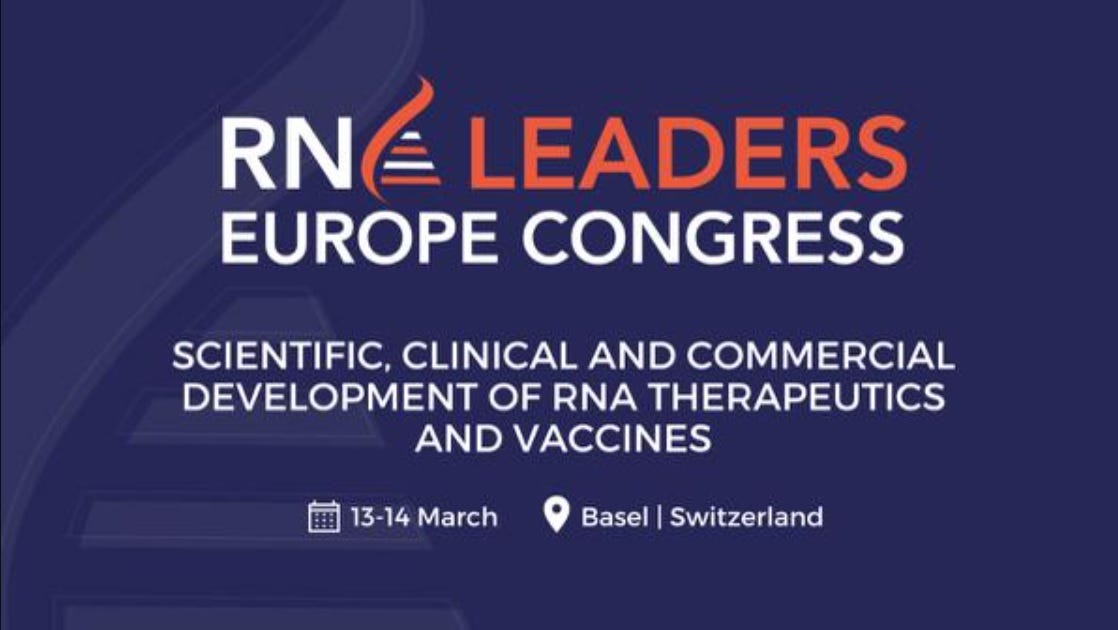Biotech is Rocket Science (Sometimes Literally)
ALSO: RNAs' Novel Function Revealed in a Breakthrough; Neuroscience is a $600+ Billion Market; New Ways to Combat Aging with CAR T-cell Therapies
Hi! I am Andrii Buvailo, and this is my weekly newsletter, ‘Where Tech Meets Bio,’ where I talk about technologies, breakthroughs, and great companies moving the biopharma industry forward.
If you've received it, then you either subscribed or someone forwarded it to you. If the latter is the case, subscribe by pressing this button:
Now, let’s get to this week’s topics!
Weekly tech+bio highlights:
🔬 Merck & Co. signs a $220M deal with Unnatural Products to develop macrocyclic peptide candidates for oncology, leveraging AI and chemistry to innovate in drug discovery.
🔬 Mayo Clinic launches stem cell experiment on SpaceX Falcon 9 to space to study bone loss in space, aiming to improve tissue repair and treatments for osteoporosis and prolonged bedrest patients, with potential for Mars travel insights.
💰 DNA Nanobots closes pre-seed investment round, launching a BioPharma Partner Program to offer custom biopharma solutions for targeted therapeutic delivery, advancing drug development with its antibody-targeted DNA nanoparticle technology.
🔬 Merck & Co. is exploring Variational AI's Enki technology, a generative AI platform that generates small molecules based on target product profiles (TPPs) and user-defined attributes, aiming to discover novel small molecules for drug development.
🚀 Cognizant expands its agreement with Takeda to support the biopharmaceutical company's digital transformation, focusing on enhancing technology infrastructure and speeding up innovation and market readiness through a "build, operate, transform, and transfer" model.
🔬 EraCal Therapeutics partners with Novo Nordisk on an obesity treatment program, receiving €235m in potential payments. Novo Nordisk gains exclusive rights for development and commercialization, focusing on a novel oral, small-molecule approach to regulate appetite and body weight.
💡 Nearly 48% of healthcare and pharma firms in India plan to adopt first-gen AI solutions within a year, signaling a significant shift towards digital technology adoption in traditionally conservative sectors, according to an EY report.
📄 FDA accepts Deliberate AI's AI-powered tool for assessing anxiety and depression into its ISTAND pilot, marking a significant advancement in drug development and mental health assessment with AI.
🔬 Basecamp Research and Protein Evolution collaborate to develop novel enzymes for the infinite recyclability of polyurethane and nylon, aiming to tackle 10% of global plastic waste and advance sustainable materials through AI and biotechnology.
🔬 Japan-based SEKISUI CHEMICAL CO., LTD. and RevolKa enter a contract research agreement for RevolKa to develop highly functional proteins using its AI-driven platform, aiProtein®, for pharmaceutical and industrial applications.
💰 Genentech and GenEdit announce a partnership worth up to $644m, focusing on using GenEdit's NanoGalaxy platform for non-viral gene therapy delivery in autoimmune diseases.
🔬 Evaxion Biotech announces the development of AI-Immunology powered cancer vaccines targeting endogenous retroviruses (ERVs), offering new treatment avenues for patients unresponsive to standard immunotherapies.
🔬 CN Bio and Altis Biosystems collaborate to create an integrated 'organ-on-a-chip' model, combining liver and gut systems for improved drug testing accuracy, potentially eliminating pre-clinical animal testing and reducing drug development costs.
🚀 Abzena launches AbZelect and AbZelectPRO, new cell line development platforms designed to accelerate the production of antibodies and recombinant proteins, potentially reducing the time to clinical trials and IND applications with high-yielding cell lines.
💰 GSK partners with Elegen, leveraging its proprietary DNA manufacturing technology for vaccine and medicine development, with Elegen potentially receiving up to $35 million in support and fees, plus future revenues and a possible equity investment from GSK.
Event Date: March 13, 2024 - March 14, 2024
Location: Switzerland, Congress Center, Basel;
Register: Link
Exclusive promo code for our readers: MMBT15
Mayo Clinic's Stem Cell Research Takes to Space
A new mission aboard SpaceX CRS-29, launching from NASA's Kennedy Space Center in Cape Canaveral, Florida, on January 30, 2024, includes a stem cell research experiment led by Dr. Abba Zubair of the Mayo Clinic.
This project aims to investigate the effects of microgravity on stem cells, with a focus on understanding and addressing bone loss experienced during space missions and in medical conditions on Earth.
The research led by Dr. Zubair, who specializes in laboratory medicine and pathology at Mayo Clinic in Florida, centers on mesenchymal stem cells from bone marrow.
These cells are crucial for tissue repair and regeneration. By studying their behavior in the absence of gravity, the team seeks insights into bone density loss—a common issue for astronauts on long-duration flights.
The goal is to apply these findings to develop strategies and treatments for preventing bone loss in space travelers and people with osteoporosis or those bedridden for extended periods on Earth.
The Two-Stage Space Experiment
The experiment comprises two space flights. The first will evaluate the impact of microgravity on bone-forming stem cells, while the second, planned for later in the year, will investigate the effects on other cell types involved in bone formation and loss. This stage will also test a compound potentially useful for treating bone loss in both space and terrestrial environments.
This project builds on Dr. Zubair's previous space research. In 2017, stem cell samples were sent to space to test their ability to withstand the environment and their potential for accelerated mass production in microgravity. These studies have shown that growing stem cells in weightlessness is safe and feasible, laying groundwork for their use in treating various diseases.
The Mayo Clinic's collaboration with Bioserve Space Technologies in Boulder, Colorado, which supplies the space flight hardware, facilitates this ongoing exploration into how space conditions affect human health. This research not only aims to mitigate the risks of space travel but also holds potential for advancing medical treatments for bone loss conditions affecting people worldwide.
Drug Development in Space is a Growing Opportunity
Mayo Clinic is not the only company venturing into space to use a microgravity environment for research purposes.
Last year, Florida-based Redwire Space (NYSE: RDW), a space infrastructure company, announced the first spaceflight mission for its cutting-edge in-space pharmaceutical manufacturing platform, PIL-BOX. This first mission sent Eli Lilly and Company’s materials to space to conduct three critical experiments in microgravity, focused on developing advanced treatments for diabetes, cardiovascular disease, and pain.
Understanding crystal growth and design can inform the entire drug development and design process as pharmaceutical companies look to deliver new, optimized treatments to help patients on Earth. Previous spaceflight investigations indicate that growing crystals in the microgravity of space could yield a more uniform product with fewer imperfections. The new platform by Redwire was launched onboard SpaceX’s 29th cargo resupply services mission (SpaceX-29) for NASA to the International Space Station (ISS).
Back in March 2023, Bristol Myers Squibb embarked on its second mission to research protein crystallization in microgravity aboard the ISS, aiming to develop more stable and concentrated biologic medicines that could lead to simpler, at-home patient treatments. BMS experiment was launched as part of SpaceX's 27th commercial resupply mission to the ISS.
Also, Merck has been working on crystalline suspensions of monoclonal antibodies, like those in Keytruda, their oncology drug, finding that crystals grown in space have lower viscosity and better injectability properties. This could transform the drug delivery method from lengthy infusions to quick injections.
Protein crystallization is not the only interest of life science companies in space. On SpaceX-29, Redwire also launched materials for an investigation that will bioprint cardiac tissue on orbit using Redwire’s BioFabrication Facility (BFF). This type of technology could be used to develop heart patches that can be applied to the outside of damaged hearts and advance our ability to print complex, thick tissues that cannot be produced on Earth.
In September 2023, Redwire announced that it had successfully 3D-bioprinted the first human knee meniscus on orbit using BFF. The print was returned to Earth for further study and analysis.





